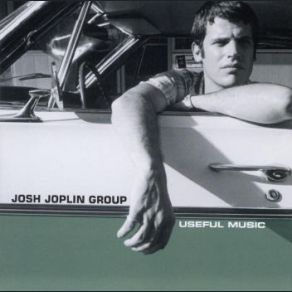Useful Music
Download links and information about Useful Music by Josh Joplin Group. This album was released in 1999 and it belongs to Rock, Alternative, Songwriter/Lyricist genres. It contains 13 tracks with total duration of 51:48 minutes.

|
|
|---|---|
| Artist: | Josh Joplin Group |
| Release date: | 1999 |
| Genre: | Rock, Alternative, Songwriter/Lyricist |
| Tracks: | 13 |
| Duration: | 51:48 |
| Buy it NOW at: | |
| Buy on iTunes $9.99 | |
Tracks
[Edit]| No. | Title | Length |
|---|---|---|
| 1. | Matter | 4:13 |
| 2. | Gravity | 3:03 |
| 3. | Here I Am | 4:18 |
| 4. | Undone | 4:09 |
| 5. | Camera One | 4:32 |
| 6. | I've Changed | 4:12 |
| 7. | Trailways | 3:59 |
| 8. | Who's Afraid of Thomas Wolfe? | 4:00 |
| 9. | Phil Ochs | 3:11 |
| 10. | Superstar | 3:33 |
| 11. | Human | 4:24 |
| 12. | Dutch Wonderland | 3:54 |
| 13. | I've Changed (Alternate Version) | 4:20 |
Details
[Edit]Prior to recording his debut album, Josh Joplin kicked around — not only the music scene, but also life in general — in the spirit of a couple of his idols, Bob Dylan and Phil Ochs. He set out on the road to the hometowns of both men and trekked through Woody Guthrie country, became a Greenwich Village-style folksinger and then headed south to the coffeehouses of Georgia, before assembling a full band and recording Useful Music. The album reflects some of the real-life lessons learned along the way and mixes a variety of inspirations — from Appalachian folk (the slight vocal yodel on "Gravity") and Guthrie to gospel — in a sensational set of songs delivered with a forward-looking veneer. Shawn Mullins, a fan of the band since its formation, produced the bulk of the album and does a stellar job of layering modern rock production values (an atmospheric sheen, subtle electronic touches) without drowning the deep roots of the music. The songs are undoubtedly messengers of the milieu — the beginning of the 21st century — from which they emerged. They are frequently referential and pop cultural. There are references, for instance, to Sugar Ray, John Mellencamp, and Freddie Prinze, Jr., and "Camera One" is in part inspired by the movies of Paul Thomas Anderson. But the observations have a much more ageless wisdom, and the references are just as often deferential. There are nods to Elvis and Roosevelt's New Deal, and the narrative recounted in "Camera One," which looks into the lives of people whose faith and dreams were abandoned long ago, could pass for a Depression-era vignette. Almost every song features indelible, timeless insights of the everyday and small epiphanies arrived at by out-of-luck dreamers. One of the reasons the contemporary edge of the music has such an impact is because it brings home the point that any of us could be these people, cut from the small-town Americana cloth of "Dutch Wonderland," but nevertheless cognizant that — as the famous dictum at the heart of "Who's Afraid of Thomas Wolfe?" points out — we can never really go home again. Above all, it is an album of keen discernment. Joplin is unfailingly adroit and street smart, sober-minded and tough. He doesn't mask his bitterness when it surfaces, and his songs never flinch from honesty even when it might be more prudent to believe the lie. They discover truth in multiple places, or rather find that truth can be a negating factor as often as it liberates you. And yet they stop short of cynicism. Joplin really comes off as a hopeless romantic, and he only comes off so acerbically because he knows going in that romance always remains an unfulfilled promise. And yet beneath the surface of each song, there is an identifiable yearning, a sense that dreams, when stripped of their impossibly wide-eyed passions, are even more worthy of being dreamed, even if the realities are much more complex and ambiguous to deal with. It turns the mood of Useful Music as beautiful and, ultimately, optimistic as it is sorrowful and pragmatic, like the moment you tangibly understand for the first time that you can go forward only by letting go of a part of yourself. More than just useful, the music is, in fact, the stuff of life.